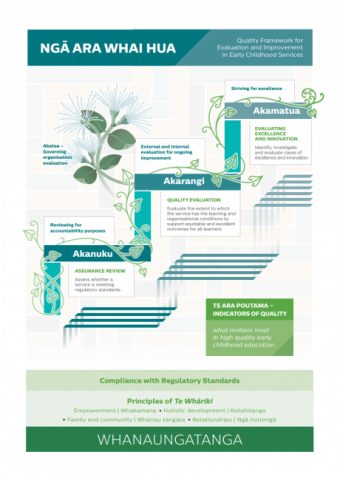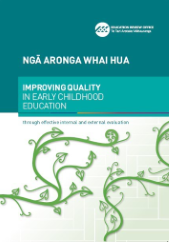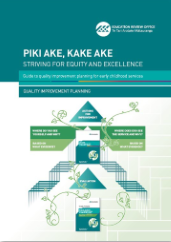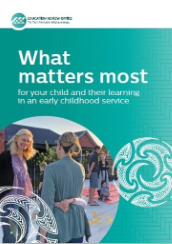
Ngā Ara Whai Hua: Quality Framework for Evaluation and Improvement in Early Childhood Services outlines our approach to review and evaluation for accountability and improvement.
This framework is very strongly focused on improvement while maintaining a focus on compliance with regulatory standards, and provides a new set of indicators to support services in continuous improvement. The ultimate aim is to ensure quality early learning.
This Quality Framework encourages services towards continuous improvement, and shows how we are differentiating our evaluation approach and how we are reporting our findings.
The Quality Framework will be the “steel backbone” for evaluating quality and performance and a basis for new ways of reporting our findings to its various audiences.
We want all services to be on a pathway of ongoing sustained improvement.
Resources to support Ngā Ara Whai Hua – Quality Framework for Evaluation and Improvement in Early Childhood Services
- Te Ara Poutama Indicators of quality for early childhood education: what matters most
- ECE Improvement Framework (teacher-led services). (PDF, 100.42 KB)
- Ngā Rāpupuku Indicators poster
The following resources are additional to, and complement, the shared resources above. ERO has developed these resources to further support your service’s internal evaluation for improvement, and to help parents know what to expect from their child’s service. These complete the suite of Ngā Ara Whai Hua resources that support evaluation for improvement in early childhood services.

- Ngā Aronga Whai Hua – Improving quality in early childhood education through effective internal and external evaluation (PDF 2.51 MB)
Ngā Aronga Whai Hua – Improving quality in early childhood education through effective internal and external evaluation has been developed to support your service to engage in internal evaluation and ERO’s external evaluation using Te Ara Poutama – Indicators of quality for early childhood education: what matters most. It builds on Effective Internal Evaluation for Improvement (2016) and replaces most of the content in He Pou Tātaki: How ERO reviews early childhood services (2013). This resource:
- provides an overview of Ngā Ara Whai Hua – Quality Framework for Evaluation and Improvement in Early Childhood Services
- explores quality improvement in relation to a wide range of activities that can support improvement in early childhood services
- describes review and evaluation
- explores internal evaluation in depth, particularly in relation to what it is, why we do it, how to do it, and what it looks like when it’s done well
- provides information that can support services to engage in focused planning for improvement as part of an ongoing process of monitoring and evaluation
- highlights the benefits of integrating internal and external evaluation
- describes ERO’s approach to evaluating quality through Akarangi | Quality Evaluations.

- Piki Ake, Kake Ake. Striving for equity and excellence - Guide to quality improvement planning for early childhood services (PDF 276.63 KB)
Piki Ake, Kake Ake. Striving for equity and excellence - Guide to quality improvement planning for early childhood services has been developed to support your service to respond to the findings of internal and external evaluation and plan for improvement. This resource complements Ngā Aronga Whai Hua – improving quality in early childhood education through effective internal and external evaluation and supports the use of the Evaluation Judgement Rubric and Te Ara Poutama – indicators of quality for early childhood education: what matters most. It includes two examples of improvement planning as a guide for your own planning.

What matters most for your child and their learning in an early childhood service is a resource for parents and whānau to help them know what they can expect from an early childhood service and includes questions they might ask about the quality of their child’s service. We’ve based the guide on what we know matters most in high-quality early childhood education. Research shows that quality education and care in early childhood contributes to children’s success as lifelong learners.